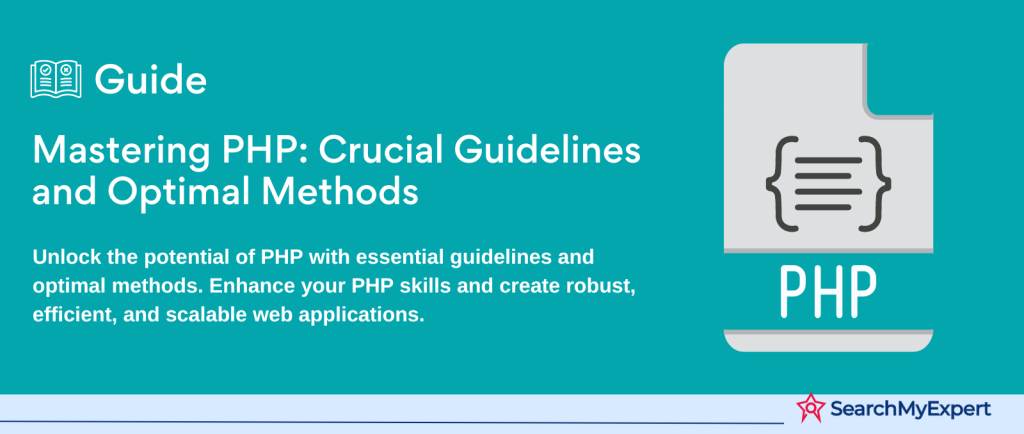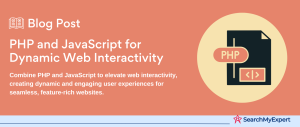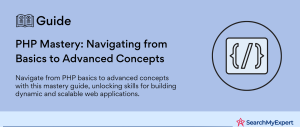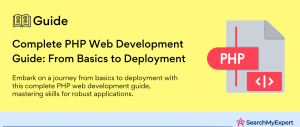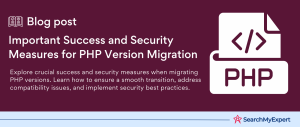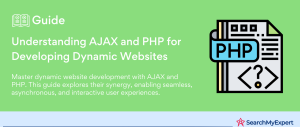PHP Coding Standards and Best Practices
Embracing the Power of PHP in Web Development
PHP, a cornerstone of modern web development, is more than just a scripting language. It’s the magic behind countless dynamic websites and applications, powering everything from blogs to the most complex enterprise solutions. Why PHP? It’s versatile, open-source, and incredibly user-friendly, making it a top pick for developers worldwide.
The Why and How of Coding Standards in PHP
Imagine a world where every PHP code is a puzzle, unique and undecipherable. Chaos, right? That’s where coding standards come in. They are the rulebook for writing clean, understandable PHP code. Adhering to these standards means easier collaboration, fewer bugs, and a smoother development process.
Benefits of PHP Coding Best Practices
- Enhanced Readability: Like a well-organized book, standards make code easy to read and understand.
- Maintainability: Standardized code is easier to maintain and update.
- Security:
Adhering to best practices reduces vulnerabilities. - Performance Efficiency: Optimized code runs faster and consumes less resources.
- Team Collaboration:
Standards create a common language among developers.
PHP, with its flexibility and power, demands a disciplined approach. Coding standards and best practices are not just recommendations; they are essential for creating robust, secure, and efficient web solutions.
Understanding Coding Standards
The Blueprint of PHP Development: Coding Standards
Coding standards in PHP are like the grammar rules of a language. They ensure that the code is not only functional but also readable and consistent. Think of them as a playbook that guides developers to write code in a unified style, making it easier for teams to understand, maintain, and manage the codebase.
Navigating the PHP Standards Recommendations (PSR)
Among the various coding standards, the PHP Standards Recommendations (PSR) stand out. They are a collection of common guidelines and best practices adopted by PHP developers. Key PSRs include:
- PSR-1:
Basic Coding Standard – It’s about the basics: files, classes, namespaces, and related elements. - PSR-2:
Coding Style Guide – This dives into the style: indentation, control structures, and line spacing. - PSR-12:
Extended Coding Style Guide – An extension of PSR-2, addressing more detailed aspects of PHP coding.
Elements of a Coding Standard in PHP
- Indentation: Think of this as organizing your code in a neat, readable manner.
- Naming Conventions:
This is all about consistency in naming variables, functions, classes, etc. - Code Structure:
It’s the architecture of your code – how classes, methods, and functions are organized. - Commenting and Documentation: Essential for understanding the why and how of code segments.
By embracing these standards, PHP developers can ensure their code is not just functional but also a model of clarity and efficiency.
Essential Coding Best Practices
Crafting Readable PHP Code: Clarity is King
Readability in coding is akin to storytelling – it must be clear, engaging, and easy to follow. Here’s how to make PHP code readable:
- Descriptive Variable Names: Choose names that reflect the purpose of the variable.
- Meaningful Comments:
Comments should explain the ‘why’ behind the ‘what’. - Proper Formatting: Consistent use of indentation, line breaks, and spacing.
Think of readable code as a well-written novel; it should flow naturally and be easy to understand.
Fortifying PHP Code: Security as a Priority
PHP is powerful yet vulnerable. Key areas to fortify include:
- Input Validation:
Always verify user input. - SQL Injection Prevention:
Use prepared statements and parameterized queries. - Data Sanitization:
Cleanse data to prevent malicious code execution.
Remember, security in PHP is not an option; it’s a necessity.
Performance: The Need for Speed and Efficiency
Optimizing PHP code isn’t just about speed; it’s about resource efficiency. Here’s how to turbo-charge your PHP code:
- Caching: Store parts of your site that don’t change often.
- Efficient Data Structures:
Choose the right tool for the right job. - Smart Algorithms: Sometimes, a change in approach can dramatically increase efficiency.
Best practices in PHP coding are not just about following rules; they’re about writing code that’s readable, secure, and performs like a well-oiled machine.
Advanced Best Practices
Elevating PHP with Object-Oriented Programming (OOP)
Object-oriented programming in PHP isn’t just a technique; it’s an art form. It brings structure, reusability, and flexibility to your code. Key OOP concepts include:
- Encapsulation:
Protecting the data within a class from external modification. - Inheritance: Extending classes to create new functionalities without altering existing code.
- Polymorphism:
Using a single interface to represent different data types.
OOP in PHP is like building with LEGO; it’s modular, adaptable, and incredibly creative.
Design Patterns: The Architectural Blueprints
Design patterns in PHP are tried-and-tested solutions to common problems. They are the secret recipes for efficient and maintainable code. Some popular patterns include:
- Factory Method: Delegate the creation of objects to a separate method.
- Singleton:
Ensure a class has only one instance. - Observer:
Create a subscription mechanism to notify multiple objects about any events that happen to the object they’re observing.
Design patterns are the architects of your code, structuring it in a way that’s both elegant and practical.
Testing: Ensuring PHP Code Integrity
Testing is not just a phase; it’s an integral part of PHP development. It includes:
- Unit Testing: Testing individual units or components of the code.
- Integration Testing: Ensuring different parts of the application work together as intended.
Remember, tested code is trusted code. It’s the safety net that catches bugs before they become problems.
Tools and Resources
Empowering PHP Development with the Right Tools
To adhere to PHP standards and best practices, having the right tools is crucial. They ensure your code is not just good, but great. Key tools include:
- PHP_CodeSniffer:
This tool checks your PHP code against defined coding standards, highlighting any deviations. - Psalm:
A static analysis tool, Psalm helps in identifying potential errors in your PHP code before they become problems.
Think of these tools as your coding GPS, guiding you to write clean, efficient, and standard-compliant PHP code.
Online Resources and Documentation: The PHP Knowledge Hub
Online resources are the libraries of the digital world for PHP developers. They include:
- Official PHP Documentation:
The go-to manual for everything PHP. - PSR Documentation:
Deep dive into PHP Standards Recommendations.
These resources are like your PHP encyclopedia, always ready to provide answers and insights.
Community Forums and Q&A Platforms: Learning and Support
The PHP community is vibrant and supportive. Key platforms include:
- Stack Overflow:
A treasure trove of Q&A for PHP developers. - PHP Forums: Places to share knowledge, discuss challenges, and get advice.
Imagine these forums as your virtual coffee shop, where developers meet, share, and learn from each other.
Common Pitfalls and Anti-Patterns
Steering Clear of PHP Development Pitfalls
In the world of PHP development, pitfalls, and anti-patterns are like hidden traps. Being aware of them is crucial. Common mistakes include:
- Global State Usage: Over-reliance on global variables can lead to unpredictable behavior.
- Hard-Coding Values: This limits flexibility and makes maintenance a nightmare.
- Ignoring Error Handling: Not managing errors can lead to unstable applications.
These mistakes are like coding landmines, ready to disrupt your project at any moment.
Understanding the ‘Why’ Behind Pitfalls
Every pitfall has a reason, often rooted in convenience or lack of understanding. The consequences can range from minor bugs to major system failures. Knowing the ‘why’ is key to prevention.
Best Practices: The Path to PHP Excellence
To avoid these pitfalls:
- Utilize Local Scope:
Keep variables confined to where they are needed. - Externalize Configuration: Store configurations outside the code.
- Robust Error Handling:
Implement comprehensive error management strategies.
Consider these best practices as your roadmap to safer, more reliable PHP development.
Wrapping Up: The PHP Code of Excellence
As we journey back from the depths of PHP coding standards and best practices, let’s encapsulate the key takeaways:
- Adherence to Standards: Like following a map, coding standards guide PHP developers towards writing cleaner, more efficient code.
- Best Practices:
They’re the golden rules – ensuring readability, security, performance, and more. - Continuous Learning: PHP development is an evolving landscape, demanding ongoing education and adaptation.
The Lasting Impact of Best Practices
Applying these principles in PHP development is not just about writing code; it’s about crafting experiences, building secure applications, and contributing to the vast, dynamic world of web technology.
An Invitation to Excel
Let’s not see this as the end but as a new beginning. A continuous journey towards mastery in PHP development, guided by standards, enriched by best practices, and fueled by an unquenchable thirst for knowledge.
Conclusion
In this exploration of PHP coding standards and best practices, we delved into the essence of writing excellent PHP code. From embracing readability and security to optimizing performance, we highlighted the significance of following coding standards like PSR-1, PSR-2, and PSR-12. We also touched upon the importance of tools like PHP_CodeSniffer and Psalm, and the value of community support. Ultimately, this journey underscores the vital role of continuous learning and improvement in mastering PHP, ensuring that our code not only functions well but excels in every aspect of modern web development.
Collaborate with expert PHP Development Service Agencies for dynamic websites.
Table of Contents
Toggle
